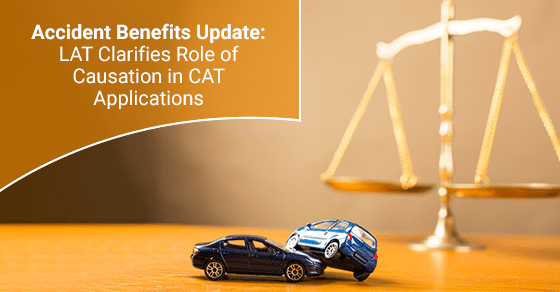
In Applicant v TD Insurance, a recent decision of the Licence Appeal Tribunal (LAT), Member Sewrattan had to consider whether an insurer could use causation as grounds for refusing to fund rebuttal assessments requested by the unnamed applicant to determine whether he had suffered a catastrophic impairment (CAT) under the Statutory Accident Benefits Schedule (SABS).
The applicant struck his head on a window as a passenger in a rear-end collision. He denied suffering significant physical injuries. He claimed that his ongoing psychiatric and cognitive impairment was caused in part or whole by the collision.
TD accepted that the applicant was suffering from serious psychiatric illness. Approximately two months before the accident he had been hospitalized with a differential diagnosis of manic episode or schizophreniform disorder. As of the hearing date, he had been declared incompetent and required a litigation guardian.
However, given his history of non-compliance with his medication schedule and the pre-existing nature of the illness, TD took the position that the collision did not cause or contribute to the applicant’s condition, and placed him under the Minor Injury Guideline (MIG), which capped his entitlement to benefits at $3500.
The applicant repeatedly submitted requests for a variety of assessments to determine the issue of whether the collision was a cause of his ongoing impairment. TD denied these requests and scheduled a battery of its own assessments mirroring those requested by the applicant to support the denial. Based on 5 assessments, TD concluded that the applicant’s psychiatric impairment was unrelated to the collision. In response, the applicant submitted an OCF 19 seeking a CAT determination. TD denied this application as well and had its 5 assessors perform CAT assessments based on their earlier reports.
Given the nature of the applicant’s impairments, the CAT determination would either fall under Mental and Behavioral Disorders (MBD) or Whole Person Impairment (WPI]. TD’s assessors did not consider MBD and assigned a WPI rating of 0%. As of the hearing, including paper reviews, TD had commissioned 13 reports while refusing to fund the applicant’s 6 proposed CAT rebuttal assessments.
At the hearing, the applicant argued that an insurer did not have the right under the SABs to deny a CAT determination and could only dispute the reasonableness of the costs submitted. TD claimed that it could challenge whether the proposed assessments were themselves reasonable. In this case, there was no point funding assessments since it had concluded that the collision was not the cause of the applicant’s impairments.
Member Sewrattan refused to comment conclusively on which of these perspectives was correct, noting that both led him to the same conclusion in this case. He was sympathetic to TD’s position and acknowledged that the applicant faced serious causation challenges. However, Member Sewrattan held that it was unfair procedurally to deny the applicant access to assessors of his own choosing based on causation when CAT rebuttals were requested to determine exactly the issue of whether the collision was a cause of his ongoing impairments. This was particularly the case since TD had been willing to fund 13 assessments to disqualify the applicant’s claim. As well, it was evident that the CAT assessors had not performed their role objectively or comprehensively. For example, the CAT team had not provided any WPI rating for the applicant’s psychiatric impairments. Nor had it assigned any rating to, or even investigated, the applicant’s cognitive dysfunction, identified by the CAT psychiatric assessor.
Therefore, Member Sewrattan found that the applicant was entitled to funding at the rates allowed under the SABS for 6 assessments to determine whether he had suffered a CAT impairment from the collision.
If you have suffered serious injuries in an automobile accident and have questions about Catastrophic Impairment or other issues related to your recovery, please contact us for a free consultation. At Campisi LLP, "Clients First, Excellence Always" is our commitment to you.
Subscribe to our newsletter
Get free insights delivered right to your inbox
Give us your email address and we’ll send you the latest information on updates to the legal and insurance system and learn how you can make the best recovery possible.
.jpg?width=726&height=440&name=image%2013%20(1).jpg)
Recent Posts
Put our expertise to work for you.
If you or a loved one has been seriously injured, you need a personal injury lawyer who puts client care first and who also knows how to navigate the complex legal system.
Contact Us Now